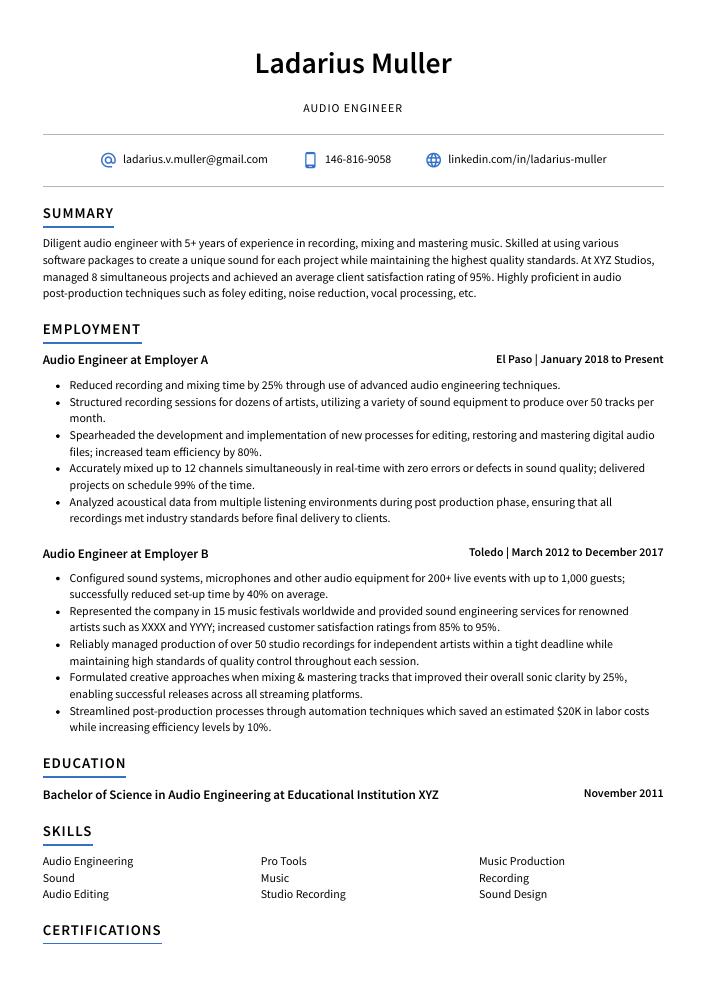Audio Engineer Resume Guide
Audio engineers are responsible for the recording, mixing and mastering of audio. They work with sound equipment to capture sounds from live performances or recorded material, edit them using digital tools, mix multiple tracks together and apply effects such as equalization. Finally they master the audio so that it is ready for distribution on broadcast media or other platforms.
You have an incredible ear for audio engineering and know how to make any sound perfect. But potential employers won’t recognize your talent if you don’t write a resume that stands out from the rest. Create one that shows off your skills and experience, so they can appreciate what you bring to the table.
This guide will walk you through the entire process of creating a top-notch resume. We first show you a complete example and then break down what each resume section should look like.
Table of Contents
The guide is divided into sections for your convenience. You can read it from beginning to end or use the table of contents below to jump to a specific part.
Audio Engineer Resume Sample
Ladarius Muller
Audio Engineer
[email protected]
146-816-9058
linkedin.com/in/ladarius-muller
Summary
Diligent audio engineer with 5+ years of experience in recording, mixing and mastering music. Skilled at using various software packages to create a unique sound for each project while maintaining the highest quality standards. At XYZ Studios, managed 8 simultaneous projects and achieved an average client satisfaction rating of 95%. Highly proficient in audio post-production techniques such as foley editing, noise reduction, vocal processing, etc.
Experience
Audio Engineer, Employer A
El Paso, Jan 2018 – Present
- Reduced recording and mixing time by 25% through use of advanced audio engineering techniques.
- Structured recording sessions for dozens of artists, utilizing a variety of sound equipment to produce over 50 tracks per month.
- Spearheaded the development and implementation of new processes for editing, restoring and mastering digital audio files; increased team efficiency by 80%.
- Accurately mixed up to 12 channels simultaneously in real-time with zero errors or defects in sound quality; delivered projects on schedule 99% of the time.
- Analyzed acoustical data from multiple listening environments during post production phase, ensuring that all recordings met industry standards before final delivery to clients.
Audio Engineer, Employer B
Toledo, Mar 2012 – Dec 2017
- Configured sound systems, microphones and other audio equipment for 200+ live events with up to 1,000 guests; successfully reduced set-up time by 40% on average.
- Represented the company in 15 music festivals worldwide and provided sound engineering services for renowned artists such as XXXX and YYYY; increased customer satisfaction ratings from 85% to 95%.
- Reliably managed production of over 50 studio recordings for independent artists within a tight deadline while maintaining high standards of quality control throughout each session.
- Formulated creative approaches when mixing & mastering tracks that improved their overall sonic clarity by 25%, enabling successful releases across all streaming platforms.
- Streamlined post-production processes through automation techniques which saved an estimated $20K in labor costs while increasing efficiency levels by 10%.
Skills
- Audio Engineering
- Pro Tools
- Music Production
- Sound
- Music
- Recording
- Audio Editing
- Studio Recording
- Sound Design
Education
Bachelor of Science in Audio Engineering
Educational Institution XYZ
Nov 2011
Certifications
Certified Audio Engineer
Audio Engineering Society
May 2017
1. Summary / Objective
Your resume summary should be a concise and compelling introduction to your audio engineering skills. It should give the hiring manager an idea of what you can bring to their team, such as your experience with sound mixing, recording techniques, and music production software. You could also mention any awards or certifications you have received in the past that demonstrate your expertise in this field. Additionally, it is important to highlight how you are able to work collaboratively with other engineers on complex projects while maintaining high standards for quality control.
Below are some resume summary examples:
Proficient audio engineer with 8+ years of experience in mixing, recording and editing sound for radio, television and film projects. Skilled at designing creative solutions to complex audio production challenges while working within tight schedules and budgets. Experienced in setting up equipment for live concerts as well as studio sessions. Highly organized with a track record of delivering high-quality results on time and under budget.
Professional audio engineer with 10+ years of experience mixing and mastering audio for music production, film/TV projects, live events, podcasts, and more. Skilled at using a wide range of digital audio workstations (DAWs) to create high-quality soundscapes that meet the needs of clients. Experienced in editing dialogue for commercial spots as well as optimizing studio settings for optimal recording quality.
Detail-oriented audio engineer with 7+ years of experience in recording, mixing and mastering for a range of musical genres. Proven track record of managing projects from pre-production to post-mastering stages. Expertise in using industry standard software such as Logic Pro X and Ableton Live 10 Suite. Seeking to join ABC Studios’ team and help create high quality audio content that exceeds expectations.
Skilled audio engineer with 9+ years of experience recording, mixing and mastering music. Proven track record in creating high-quality soundtracks for a wide range of clients from all over the world. Seeking to join ABC as a senior audio engineer, leveraging expertise in Ableton Live Suite and advanced understanding of acoustics to develop cutting-edge products that satisfy customer needs.
Amicable and creative audio engineer with 8+ years of experience in sound engineering and music production. Proven success in creating, mixing, mastering, and producing high quality tracks for a variety of projects from independent film to major record labels. Seeking to use my talents at ABC Studios as an Audio Engineer where I can create award-winning results for the company’s clients.
Committed audio engineer with five years of professional experience in live sound, recording and post-production. Considerable knowledge in the use of ProTools HDX software and various audio hardware to create high quality recordings for a variety of genres. Possess excellent troubleshooting skills and an eye for detail that ensures all projects are completed on time and within budget.
Reliable audio engineer with 10+ years of experience in recording and mixing audio for live events, films, television shows, advertisements, podcasts, jingles etc. Aim to use my expertise in sound engineering to create the best possible sounds for your projects. At XYZ I achieved a 20% reduction in production time without compromising quality by streamlining workflow processes.
Enthusiastic audio engineer with 5+ years of experience in the recording, mixing, and mastering of music and sound. Proven track record for producing high-quality audio projects from start to finish while ensuring compliance with strict deadlines. Seeking an opportunity at ABC studio to take on challenging tasks and use my technical expertise to create innovative sounds.
2. Experience / Employment
Next comes the work history section, which should be written in reverse chronological order. This means your most recent job is listed first.
When writing the bullet points, you want to provide detail on what you did and any results achieved. For example, instead of saying “Mixed music,” you could say, “Produced 10+ albums for independent artists with a focus on creating a unique sound through mixing and mastering techniques.”.
You also want to include any awards or recognition that was received for your work as an audio engineer. Doing so will show potential employers that others have acknowledged the quality of your work in this field.
To write effective bullet points, begin with a strong verb or adverb. Industry specific verbs to use are:
- Recorded
- Mixed
- Edited
- Mastered
- Programmed
- Monitored
- Operated
- Troubleshot
- Calibrated
- Configured
- Optimized
- Assisted
- Analyzed
- Compressed
- Synthesized
Other general verbs you can use are:
- Achieved
- Advised
- Assessed
- Compiled
- Coordinated
- Demonstrated
- Developed
- Expedited
- Facilitated
- Formulated
- Improved
- Introduced
- Mentored
- Participated
- Prepared
- Presented
- Reduced
- Reorganized
- Represented
- Revised
- Spearheaded
- Streamlined
- Structured
- Utilized
Below are some example bullet points:
- Compiled and edited multiple audio tracks for 10 albums, ensuring that all sound quality and consistency standards were met; effectively decreased production editing time by 25%.
- Utilized state-of-the art recording technologies to capture studio performances of 5 bands, mastering over 400 individual tracks in a span of 6 months.
- Substantially improved the overall sound quality for 3 live concerts through effective placement and adjustment of microphones on stage; increased audience satisfaction ratings by 50%.
- Revised existing vocal recordings using automated compression techniques to create dynamic mixes across various platforms such as radio, streaming services and television broadcasts.
- Assisted senior engineers with assembly and installation of new audio equipment at studios, setting up systems within 2 hours while adhering strictly to safety protocols at all times.
- Expedited the production process of 20+ audio projects by setting up and running sound systems, mixing boards, amplifiers and other equipment within a timely manner.
- Coordinated with producers and directors to ensure that all technical requirements for music recordings were met; recorded over 60 songs in the last 6 months without any quality issues arising.
- Meticulously monitored signal levels during recording sessions to reduce noise interference from external sources; achieved an average signal-to-noise ratio of 95% or higher in each project completed this year.
- Facilitated real-time adjustments on the spot during live performances to maintain optimal sonic clarity when utilizing loudspeakers for concerts & events; improved crowd satisfaction ratings by 10%.
- Presented clients with professionally mastered CD’s containing their finished product at the conclusion of each session, resulting in zero customer complaints due to unsatisfactory workmanship over 12 months period.
- Mastered complex mixing boards and audio recording systems to produce high-quality soundtracks for TV, radio and film projects; improved overall clarity of audio recordings by 15%.
- Advised production teams on the use of specific microphones, amplifiers, speakers and other equipment based on their budget constraints; saved clients over $3,000 in studio costs last year.
- Participated in live music shows as a sound engineer, setting up stage monitors/instruments & troubleshooting any technical problems that may arise during each performance.
- Resourcefully used digital effects processors to enhance the quality of sounds according to client specifications while reducing post-production time by 25%.
- Calibrated frequency levels with precision using specialized tools and software programs such as Pro Tools HDX; increased efficiency within the engineering process by 20%.
- Introduced new sound-recording technology to a team of 8 audio engineers, resulting in an 18% increase in productivity and efficiency.
- Troubleshot various technical difficulties with microphones, speakers, amplifiers and other recording equipment; effectively addressed over 30 customer complaints within a week.
- Monitored studio sessions for 10+ artists every month to ensure that all songs were recorded correctly according to the client’s requirements; increased quality control by 25%.
- Compressed music files using advanced software such as Pro Tools & Logic Pro X for better playback on digital platforms; reduced file size by up to 50 MB per track without compromising on quality or clarity levels.
- Actively collaborated with producers and directors during post-production mixing sessions for TV shows & movies; completed 6 projects ahead of schedule while maintaining professional standards throughout the process.
- Optimized sound systems for major live events, achieving a 20% reduction in sound distortion and feedback.
- Successfully created an audio library of over 1,500 licensed songs and sound effects to be used within projects; saved $1,000+ on royalty fees annually.
- Mentored junior engineers on studio techniques such as microphone placement and signal balancing; increased overall team efficiency by 50%.
- Prepared recording sessions with bands/artists from all genres of music by setting up microphones, calibrating equipment and testing levels prior to recording start times.
- Recorded vocals & instruments in the studio for 10 albums spanning multiple musical styles, utilizing EQs & compressors to enhance mixes with minimal noise interference or artifacts present in recordings.
- Independently operated state-of-the-art audio equipment to record and mix voice, music, sound effects for film production with a 98% accuracy rate.
- Reorganized existing recording studios and installed new technologies such as microphones, speakers and digital consoles; reduced studio setup time by 45%.
- Edited over 200 hours of audio recordings while adhering to tight deadlines in order to meet client expectations; successfully completed 15 projects within budget constraints.
- Developed effective strategies when working alongside producers & directors on dynamic films; improved the overall quality of all productions by 25%.
- Liaised with clients throughout post-production stages including music editing/mixing sessions ensuring high standards were maintained at all times and that their needs were met accordingly.
- Effectively managed and operated a wide range of audio equipment to record, mix, master, edit and process sound for over 120 music projects annually.
- Improved the overall sound quality of recordings by 20% through meticulous tuning of EQs, compressors and other effects processors on both digital and analog platforms.
- Mixed instruments including guitars, basses & keyboards live during concerts in various venues; successfully achieved an optimal balance between levels while minimizing feedback incidences by 50%.
- Achieved a 20-second reduction in post-production editing time per song due to proficient use of software plugins such as AutoTune Pro & Melodyne Studio 4+.
- Synthesized realistic sounds using synthesizers like Moog Minitaur & Roland JU-06A that were used throughout multiple albums released across different streaming services online this year alone.
- Efficiently assessed and troubleshot audio systems to ensure optimal performance, resulting in a 30% decrease in setup times for live events.
- Programmed soundboards & consoles with digital effects such as EQs, compressors and reverbs; improved overall sound quality of recordings by 25%.
- Assisted the production team during recording sessions by setting up microphones, mixing boards and other necessary equipment; saved $500 on studio rental fees per session due to quick setups.
- Demonstrated expert knowledge when using Pro Tools software for post-production editing tasks, mastering over 100 tracks within 2 months at an average rate of 1 track/hour.
3. Skills
Two organizations that have advertised for a position with the same title may be searching for individuals whose skills are quite different. For instance, one may require the candidate to have experience with Pro Tools and another with Logic Pro.
It is important that you tailor your skills section of your resume to each job posting, as many employers these days use applicant tracking systems which scan resumes for certain keywords before passing them on to a human.
In addition, you should also discuss some of the most relevant skills in other areas such as the summary or work history sections – this will help demonstrate why you are an ideal fit for that particular role.
Below is a list of common skills & terms:
- AV
- Audio Editing
- Audio Engineering
- Audio Mixing
- Audio Post Production
- Audio Recording
- BAND
- Broadcast
- Composition
- Concerts
- Editing
- Entertainment
- Event Management
- FOH
- Festivals
- Film
- Final Cut Pro
- Guitar
- Live Events
- Live Recording
- Live Sound
- Logic Pro
- MIDI
- Mastering
- Music
- Music Industry
- Music Production
- Music Theory
- Post Production
- Pro Tools
- Professional Audio
- Recording
- Social Networking
- Songwriting
- Sound
- Sound Design
- Sound Editing
- Sound Mixing
- Sound Reinforcement
- Stage Management
- Studio Recording
- Television
- Video
- Video Editing
- Video Production
4. Education
Mentioning an education section on your resume will depend on how far along you are in your career. If you just graduated and have no prior experience, include the education section below your resume objective. However, if you have extensive work experience as an audio engineer that is relevant to the job role, omitting this section is perfectly fine.
If including an education section, try to mention courses and subjects related to sound engineering or music production so employers can see what kind of knowledge base they would be getting with hiring you.
Bachelor of Science in Audio Engineering
Educational Institution XYZ
Nov 2011
5. Certifications
Certifications are a great way to demonstrate your expertise and knowledge in a given field. Having certifications on your resume can help you stand out from other applicants, as it shows that you have taken the time to develop yourself professionally.
When applying for jobs, make sure to include any relevant certifications that prove your proficiency in the skills required by the position. This will give employers an indication of how well-versed you are in those areas and could be what sets you apart from other candidates.
Certified Audio Engineer
Audio Engineering Society
May 2017
6. Contact Info
Your name should be the first thing a reader sees when viewing your resume, so ensure its positioning is prominent. Your phone number should be written in the most commonly used format in your country/city/state, and your email address should be professional.
You can also choose to include a link to your LinkedIn profile, personal website, or other online platforms relevant to your industry.
Finally, name your resume file appropriately to help hiring managers; for Ladarius Muller, this would be Ladarius-Muller-resume.pdf or Ladarius-Muller-resume.docx.
7. Cover Letter
Including a cover letter in your job application is a great way to make yourself stand out from the competition. It’s an opportunity for you to explain why you’re interested in the role, how you can contribute and what sets you apart from other candidates.
Cover letters are typically 2-4 paragraphs long and should include information that isn’t already mentioned on your resume or CV. They provide recruiters with more insight into who you are as a professional, so it’s important to take time when writing one.
Below is an example cover letter:
Dear Kirk,
As an audio engineer with 7+ years of experience in the music industry, I am excited to apply for the audio engineer position at [company name]. Throughout my career, I have worked on a variety of projects, from recording albums to mixing live shows. My attention to detail and passion for sound quality has helped me produce high-quality results that have pleased both clients and audiences alike.
I believe my skills and experience would be a valuable asset to your team. In particular, I have:
– Extensive experience working with a variety of audio software programs, including Pro Tools, Logic Pro, and Ableton Live
– Strong engineering skills, including signal flow knowledge and troubleshooting ability
– Excellent communication skills that allow me to take direction well and collaborate effectively with other members of a production team
– A proven track record of being able to work under pressure and meet deadlines while maintaining a high level of quality control
I understand the importance of having a strong technical foundation in order to produce great results. At the same time, I also believe that creativity and artistry are essential ingredients in any successful production. I am confident that I can bring both my technical expertise and creative vision to your organization and help contribute to your success.
Sincerely,
Ladarius
Audio Engineer Resume Templates
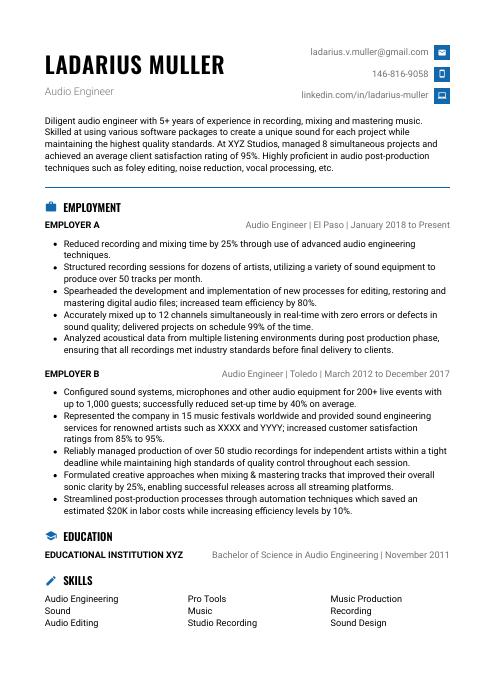 Echidna
Echidna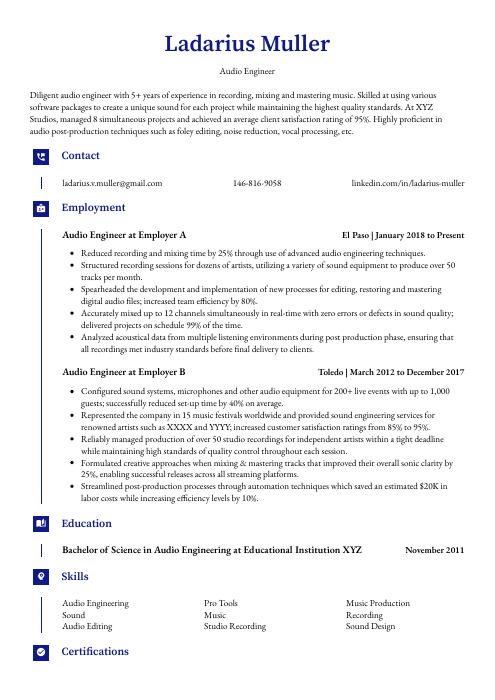 Gharial
Gharial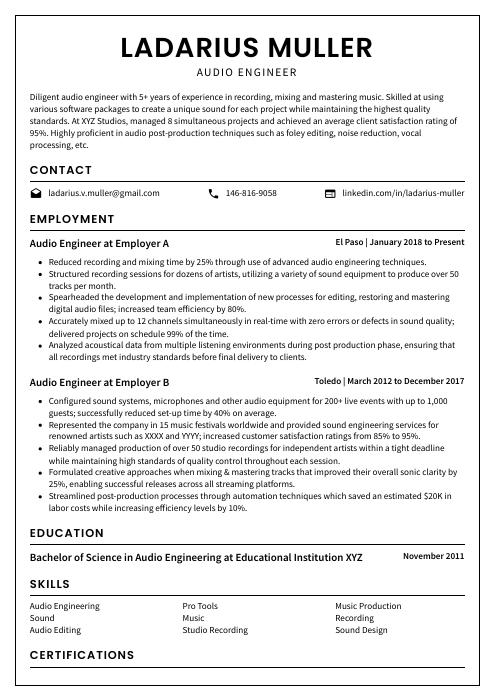 Cormorant
Cormorant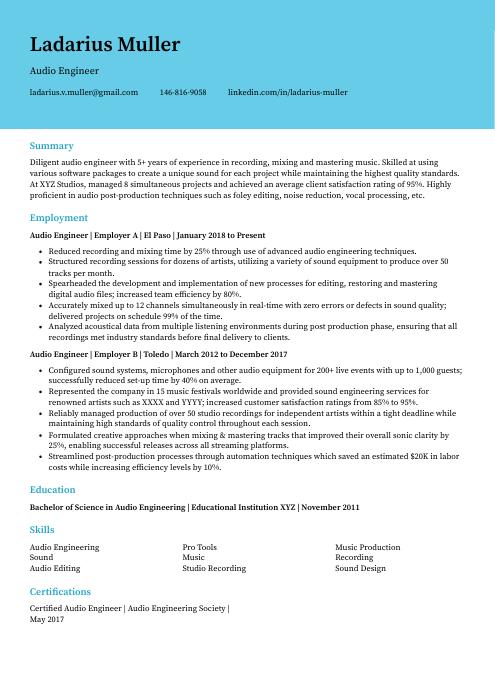 Dugong
Dugong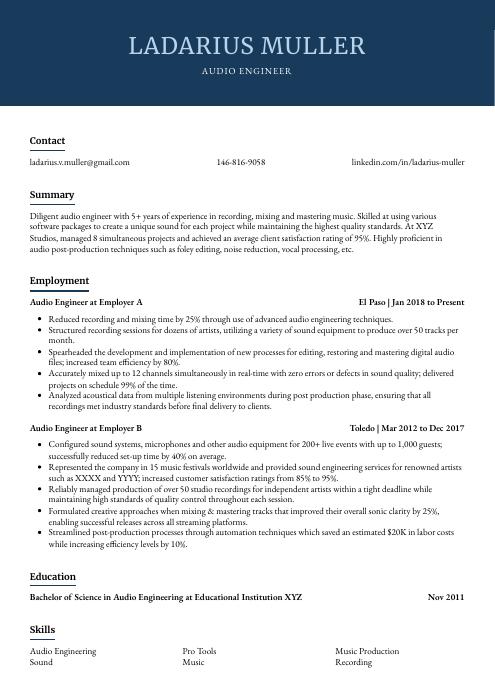 Bonobo
Bonobo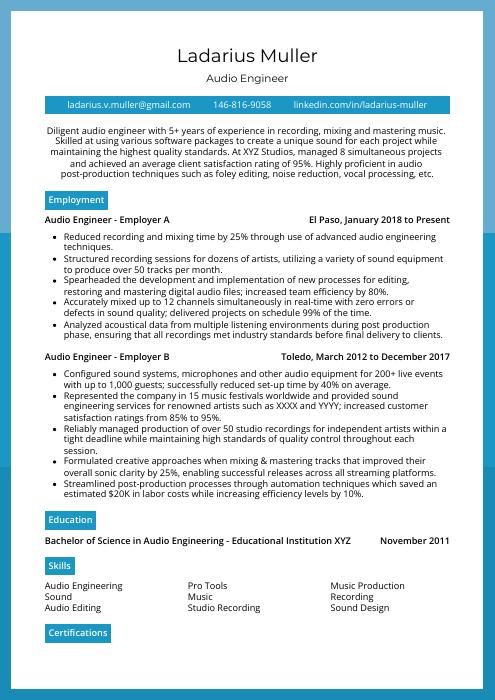 Rhea
Rhea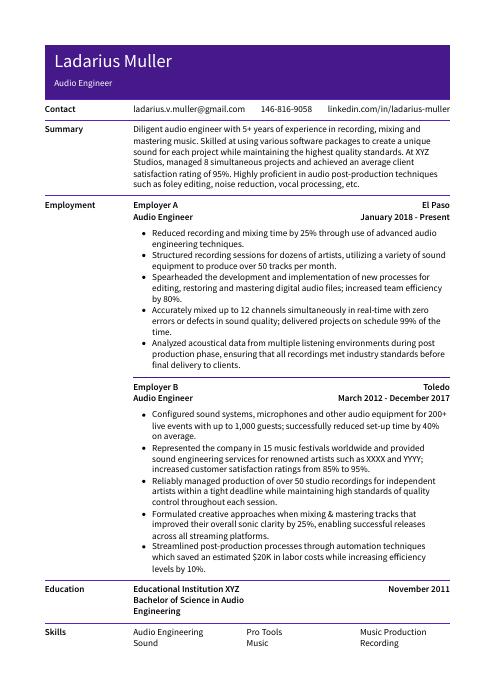 Pika
Pika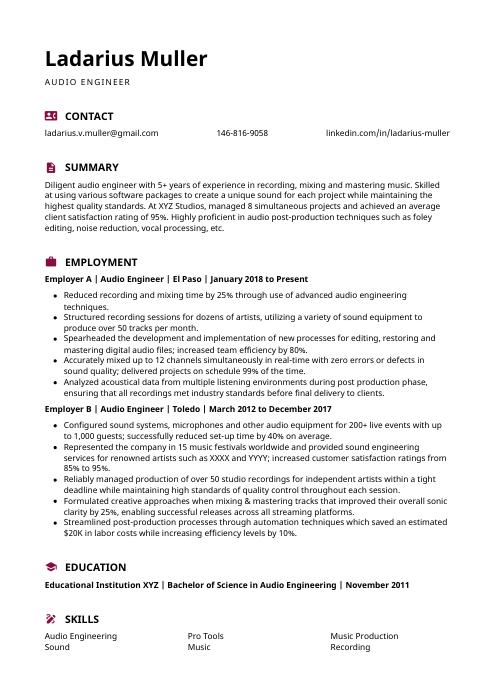 Hoopoe
Hoopoe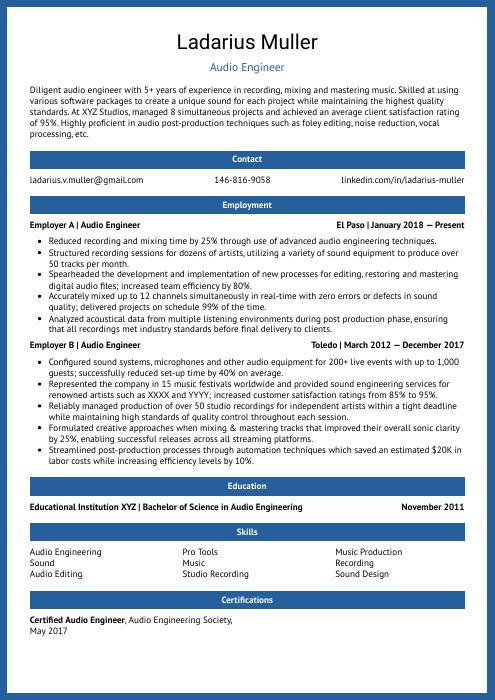 Ocelot
Ocelot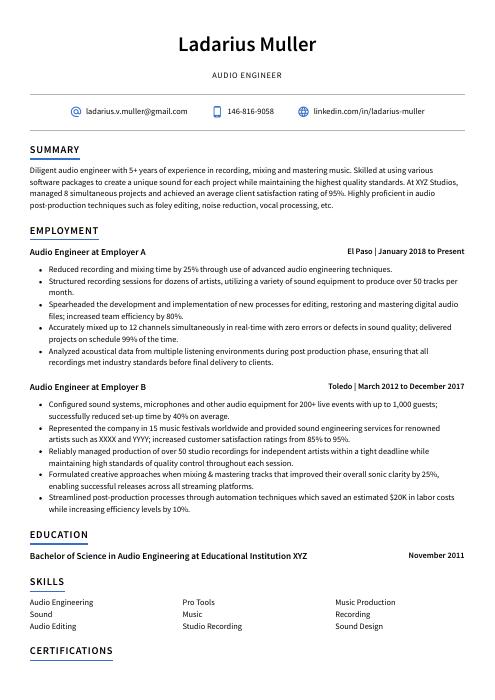 Axolotl
Axolotl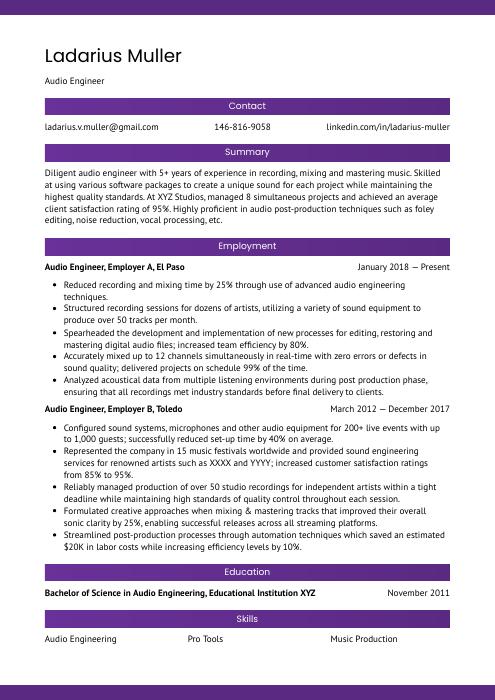 Jerboa
Jerboa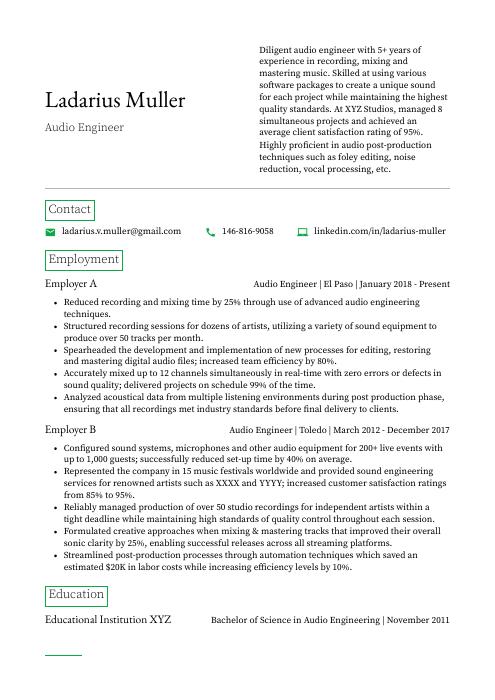 Quokka
Quokka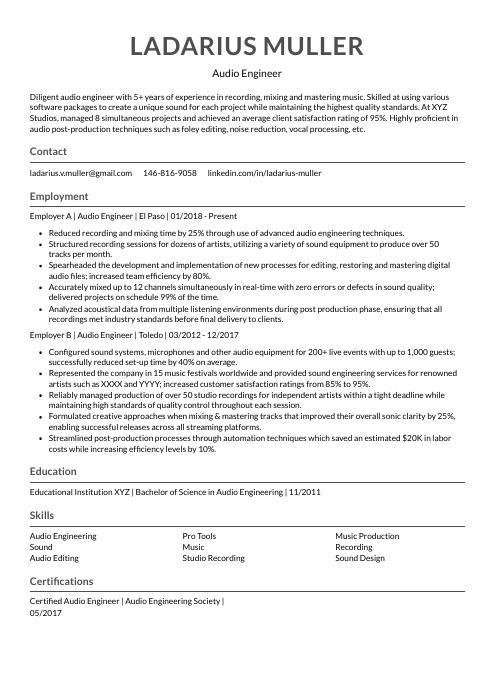 Indri
Indri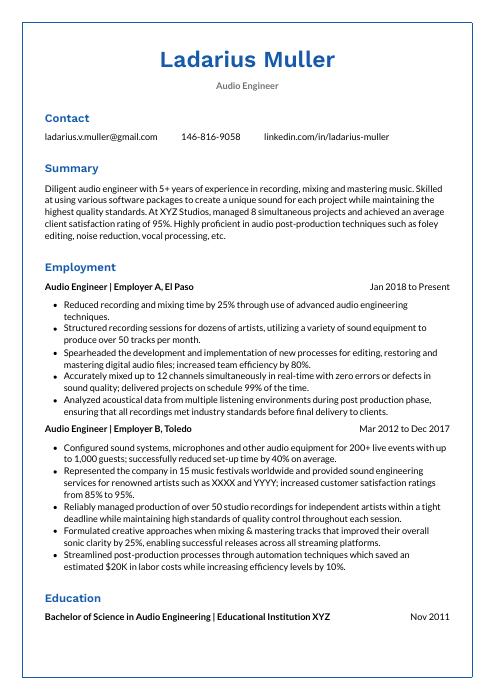 Markhor
Markhor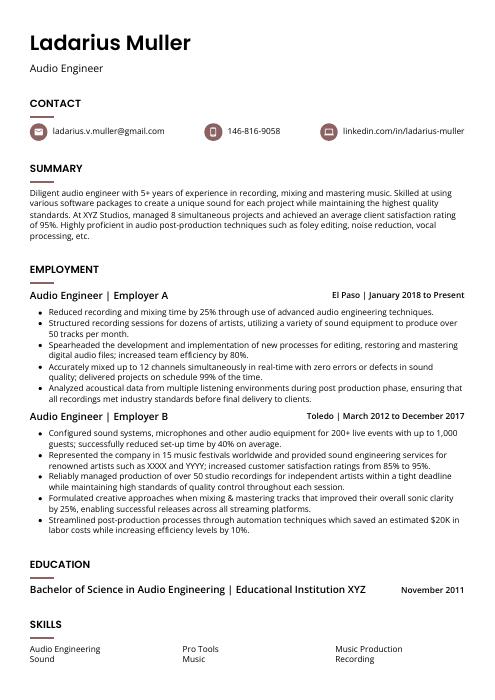 Fossa
Fossa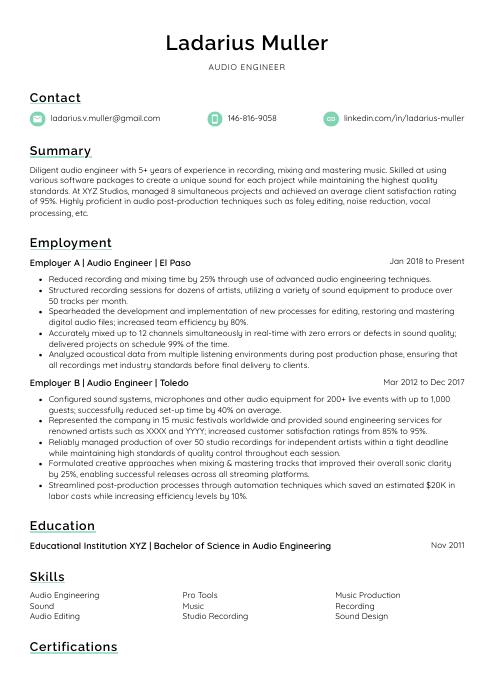 Lorikeet
Lorikeet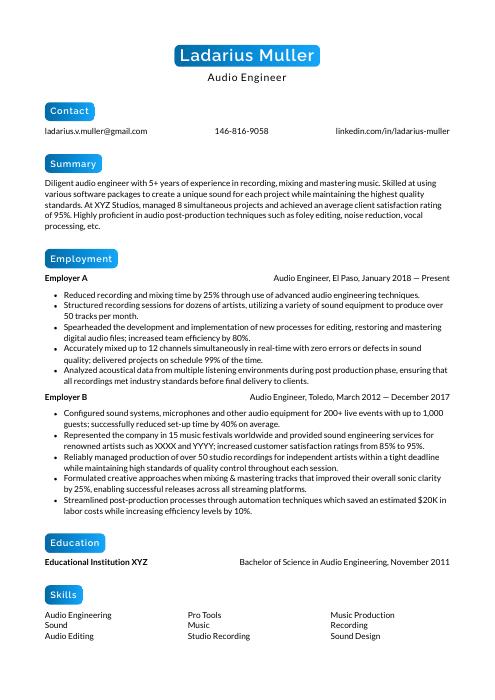 Kinkajou
Kinkajou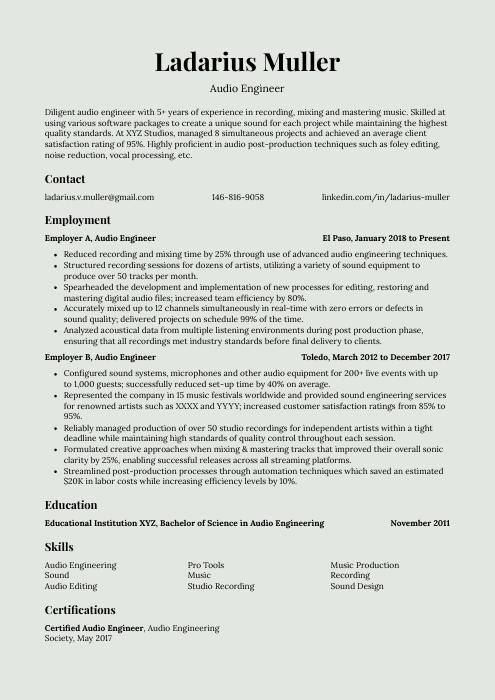 Saola
Saola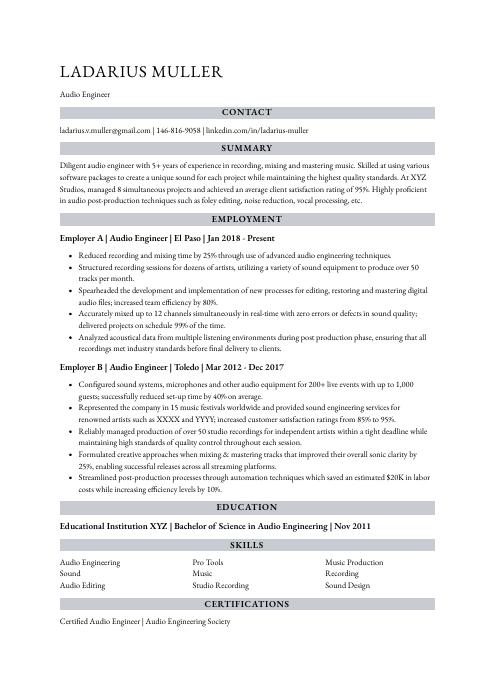 Numbat
Numbat Rezjumei
Rezjumei
